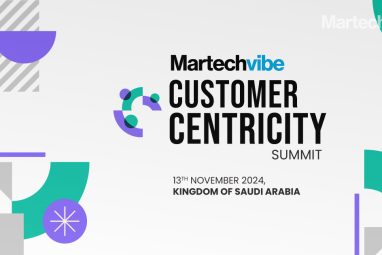Is South Africa MarTech Ready?
Did you know that there are 38.19 million active internet users in South Africa? The population of South Africa is 58.9 million. So, that’s more than half the population. Challenging, diverse and variable, the South African market is a space where innovation thrives. As in the rest of the world, the ongoing pandemic has changed […]
Topics

Did you know that there are 38.19 million active internet users in South Africa? The population of South Africa is 58.9 million. So, that’s more than half the population.
Challenging, diverse and variable, the South African market is a space where innovation thrives. As in the rest of the world, the ongoing pandemic has changed customer needs in the country, prompting new strategies of engaging with consumers.
Thanks to technology giants like Facebook, Google, Microsoft, IBM that are disrupting business, big and small, investments in marketing technology (MarTech) are expected to be high.
Despite tough economic times, the Gartner 2020 CMO Spend Survey, which surveyed 432 marketing leaders in North America, the UK, France, and Germany, believe their MarTech budgets will grow this year. And given their renewed focus on customer retention, marketing leaders are least likely to cut customer data platforms, mobile marketing platforms and digital commerce.
In South Africa, the trend, more or less, is expected to be at par, although demand collapsed in many sectors after the pandemic began, and businesses clamped down on spending. Nevertheless, marketers are looking to technology as a bright spot. Rapid digital transformation, often led by global alignment and empowered by local consumer behaviour, has spurred on the desire to invest in MarTech.
“Big blue chip companies are starting to take Martech seriously and we are seeing immense growth and adoption in SA,” says Audrey Naidoo, Head of Digital Marketing at ABSA.
But there are key challenges that brands face today. “Consumer shifts to digital during COVID and brands need to keep up with the accelerated changes; achieve growth during this time – disruption from the traditional growth model to new growth opportunities, and digital transformation – gearing the business to operate in a digital ecosystem. Investment in the right tech, skills, infrastructure – shift to cloud, automation,” Naidoo added.
Digital maturity
Using predetermined indicators, the Google BCG benchmark categorises organisations into four stages of digital maturity in the marketing sphere. The “Nascent” category to describe companies that continue to employ traditional marketing means through campaigns. “Emerging” companies are those that have begun data collection but continue to rely on “single channel optimisation,” and “Connected” firms are those that have integrated data analysis across a broad range of their operations, while “Multi-moment” companies tailor their marketing strategies to individual consumers.
These companies have invested significantly in MarTech, and are reaping its benefits to deliver an increasingly crucial customer experience.
In 2019, however, in South Africa, most brands were in the Emerging level, with many stalling in the Nascent level, with just a few teetering on the verge of entering the Connected level.
In such a scenario, there’s an evolving role of a CMO, the key position that data and technology hold in this space. Knowing the consumer is a crucial aspect of marketing strategy, and the myriad data points available in each individual’s daily life afford a significant opportunity.
Pressure, scarcity of resources, data literacy gap
The CMO Council in partnership with Televerde published a new report titled, Rising Above The Fray: How Marketers Can Right The Revenue Ship. The insights of the report are based on a survey of over 150 brand leaders and interviews with executives. Companies which participated include Cisco, F5, Pitney Bowes, Five9, PepsiCo and Henkel. According to the report, marketers face immense pressure, scarcity of resources, a data literacy gap and a sceptical CEO.
The study shows how marketers, even with limited resources, need to go deep on a handful of strategic initiatives, such as digital experience, content strategy and omnichannel. They should invest in MarTech that addresses data, customer intelligence, content and attribution.
Data related key findings:
- 85 per cent of marketers have data literacy gaps inside their teams.
- 79 per cent are only moderately successful or worse at leveraging data for customer segmentation.
- 73 per cent are only moderately successful or worse at applying data analytics for customer insights.
- 75 per cent are only moderately successful or worse at taking action on customer insights.
Though the CMO Council report wasn’t South Africa-centric, it’s a massive challenge for marketers in the country as well, with poor data literacy, to figure out how to harness data effectively. It’s crucial to understand how to effectively integrate the data being collected. Technologies such as media measurement and marketing intelligence tools and the insights they provide can answer many of the questions businesses face on data optimisation.
Leveraging data
South Africa is seeing a growth in smartphone penetration. As of January 2021, there were 38.13 million active internet users in South Africa. Among them, an overwhelming majority (over 36 million) also used mobile internet. Over 40 per cent of South Africa’s population are active social media users. That’s 22.89 million people out of an estimated population of over 58 million.
The migration of consumers online is an opportunity for businesses to bring large volumes of shopper data together from an array of sources, including loyalty programmes, point-of-sale data and eCommerce properties, and leverage it to create advanced marketing strategies.
On-boarding, matching, and segmenting these data points together will give a clear overview of who to target, where to target them, how often and with what to deliver targeted and personalised messaging and services.
Executing strategy adjustments informed by these insights is critical to increase ROI and maintain a healthy ecosystem of customer information, while keeping data privacy at the forefront of these initiatives.
Use of Artificial Intelligence
Meanwhile, South Africa’s overall investment in Artificial Intelligence is significant, with $1.6 billion invested, according to a report by Business Tech, over the past 10 years. The bulk of this investment went towards IoT and social media, followed by planning, scheduling and optimisation, as well as smart mobile. Local businesses can gain significant financial benefits by using AI solutions to optimise their operations.
Optimising technology
Technology investments, over time, will fall in line with marketers’ renewed focus on customer loyalty. But the ongoing challenge, however, is optimising the use of technology. Research shows that marketers use only half of their existing technology capabilities. Extracting their full value may come with costs such as up-skilling marketing talent or investing in workflow management applications.
There are hundreds of global vendors listed across a plethora of categories in Martech landscape in South Africa, and businesses have turned to consultancies to guide their investment strategies, optimise their marketing activities, and improve their overall customer experience with a cohesive touchpoint strategy. Consultancies, like Carbon1 and RogerWilco, can evaluate and assemble the right technology and people, identify gaps, and streamline the management of the accessibility of data, defining the path to achieving ambitious business and marketing objectives.
Also, new customer experience agencies are using technology and content to build impactful customer experiences. Innovative agencies, like Wonder led by former marketing head at Virgin Active Gareth McPherson, places the primacy of data, content and technology in building “powerful, connected customer experiences”.
Digital marketing
South Africa will continue to become more digital. The pandemic accelerated the motivation for businesses to embrace digital operations and digital customer experience.
According to Statista, spending in the digital advertising market is projected to reach $862 million in 2021. The market’s largest segment is social media advertising with a projected market volume of $345m in 2021.
Brands have to keep up with the growing expectations and demands of the customer as they are looking for more meaningful engagements. Interestingly, some brands in South Africa are using chatbots, hyper-targeted advertising and personalisation with smart content, to generate leads, provide a positive website experience, access information about customer’s demographics, likes, dislikes and employment history to target the exact prospect that meets their product and service requirements, and ultimately to build trust.
Mobile Marketing
Mobile marketing is a way businesses are using to reach consumers, quite literally, exactly where they are. In South Africa, over 70 per cent of internet users contact a business after searching for them online. They’re receptive because effective mobile marketing ensures that your brand appears in response to their search for a solution to an already-existing need.
According to Gartner, text message open and response rates are “as high as 98 per cent and 45 per cent, respectively — in contrast to corresponding figures of 20 per cent and 6 per cent for email.”
Also, with 22 million mobile social media users currently in South Africa, businesses are increasingly making sure they have a social presence.
Getting CX right
Getting CX right, managing a seamless customer journey across, from marketing through to sales, service and CRM, is a top priority in 2021. But getting this right is still a gap in delivery in South Africa. Marketers have relied heavily on consumer research conducted by their market research partners, social listening tools and consultancies’ feedback. Nando’s, a homegrown success story, which now boasts over 1,000 outlets globally and known for using a perfect mix of strategic marketing and a risqué advertising approach, believes customers want useful and frictionless engagement.
In April, Social Places, a Martech company, released stats from their online local landscape survey, offering insight into how South African consumers engage with businesses online.
According to the survey, consumers expect a more personal interaction from brands online. Over 80 per cent of consumers enjoy interacting with local businesses rather than brand head offices and it is becoming critical for brands to refine their strategies and develop interactions with their customers.
As the volume of data increases, investment in MarTech infrastructure will enable marketers to access, interpret, implement and enrich consumer data responsibly, legally and in real-time. Personalisation will improve their ability to build meaningful relationships between brands and consumers.
Also, with AI, marketers will be able to anticipate trends early and make recommendations for us to leverage.
Rise in eCommerce
Meanwhile, there has been compelling innovation in the home delivery mobile app space. A focus that meets the evolving demands of customers is high on the agenda in almost every C-Suite. Whether using traditional models on eCommerce fashion sites to broaden representation or make packaging more environmentally friendly or find ways to support local suppliers, retailers need to take bigger, more active steps to meet value-based demands.
South Africa is the 37th largest market for eCommerce with a revenue of $4 billion in 2020. The biggest player in the South African eCommerce Market is takealot.com. The store had a revenue of $451 million in 2020. It is followed by superbalist.com with $69 million revenue and woolworths.co.za with $51 million revenue. Altogether, the top three stores account for 15 per cent of online revenue in South Africa. COVID-19 has challenged and shifted many of the barriers consumers have had to online shopping.
Businesses need to understand the key factors that influence consumer behaviour and accelerate their efforts to meet consumer expectations. Building a strong go-to-market strategy and a timeline over which to execute it, both pre- and post- implementation, is crucial.
Having the right strategy and business case for an automation platform will also help establish realistic expectations of success.
Marketing automation
For brands looking to scale their online activity, a level of automation is inevitable. Experts expect the use of marketing automation in South Africa to trend upwards sharply in the coming years. Marketing automation isn’t just cost-effective, it’s time-effective as well. By setting up automated campaigns, businesses can focus on adding more value. Landing pages, forms, workflows and automated emails can help businesses cut through the clutter to deliver high quality leads who have already met some level of qualification criteria. The most important objectives of marketing automation in South Africa
— Acquiring more customers
— Improved targeting of messages
— Increasing marketing ROI
— Improving campaign management
— Improving database quality
In 2019,CleverTouch released a report on the state of the Marketing Automation industry globally, surveying 200 head marketers and CMOs in Europe, the USA, UK, Middle East, and Africa. The survey researched adoption rates, difficulties and in-house training for marketing automation software. Although the CleverTouch survey was globally focused, there’s a similar sentiment in the Marketing Automation space in South Africa — 33 per cent of individuals surveyed looked to outside talent and consulting agencies to use their marketing automation solutions, compared to a tiny 13 per cent of those that trained their in-house people to manage them.
This may be indicative of the fact that automation, although often perceived as easy to manage, is particularly difficult to leverage at scale in the country. There are several platforms, like MO, Pull, Demographica, that help to skill up and educate corporate marketing teams on marketing automation.
What will the Martech landscape look like in 2021?
Marketers are focusing on growth, looking at markets outside South Africa increasingly, especially into other parts of Africa. This will be quite a trigger for agencies in terms of their own growth plans and development. Focus on new communication channels, CX and eCommerce activities will become increasingly important to rebuild and recover from the impact of the pandemic and the fragility of the economy
Marketers’ confidence may erode and investment intentions weaken if economic challenges persist this year as well. Staying true to course requires nimble strategies.
In the B2B environment, CMOs should build and promote digital-first programming, such as webinars and digitally guided selling tools, that help answer customer questions and support conversions. On the B2C front, marketers need to focus on transparent communications with consumers through the channels that best gain authentic engagement for their products.
A key tactic for CMOs planning for post-pandemic growth is to leverage current strengths and prioritise customer sentiment.
Martech will become more crucial, but needs to adapt to a shifting marketing environment. Here are some trends that marketers should be aware:
Focus on Retention: It costs five times more to attract a new customer than to keep an existing one. Marketers need to use technology to shift their focus to not only gaining new customers, but on developing client relationships.
Innovation: With the emergence of IoT and continuing development in AI marketing, Martech companies will be able to provide clients with more robust solutions to help marketers speak directly with their audiences and establish ROI. Marketing channels will continue to be disrupted; channels that fail to adapt to change will ultimately be phased out. As consumers seek out new experiences presented by 5G, marketers must monitor trends to identify the most relevant formats to deliver rich brand experiences at scale. Also, new alliances will need to be forged between media and creative teams, platform owners, engineers and data scientists to build solutions that will harness these new consumer experiences.
Key challenges
Implementing, maintaining, and optimising businesses’ Martech is not a simple, streamlined process. Businesses should prepare to overcome key challenges before they can fully realise the benefits of marketing technology.
Selecting the Right Platform
Selecting a platform is more than finding the right technology — it extends into finding the right partner. Integrating a new system is often a challenge, and the process of working with internal and external stakeholders to roll out technology can create unexpected hiccups.
Processing Data
There’s a lot of data in today’s marketing environment. Ciphering through data to determine what is and isn’t important could be a sizable challenge. Selecting the right vendor and working together with data scientists to help analyse the vast amounts of data can help steer your marketing department in the right direction.
Working With Service Providers
The South African market has been divided into full-service and specialist agencies for some time now. While the list of criteria used by marketers to choose agencies has grown, they don’t want tall promises and grand plans with big technology, instead more focus on coaching and learning, and agile, adaptive partnerships when it comes to choosing service providers.
In a survey to what marketers want now, Agency Scope South Africa 2019/20 noted that 52.9 per cent of 207 marketing decision makers across the country prefer working with an integrated agency that offers advertising, digital, BTL, media, events, PR and other disciplines.
However, specialist agencies – particularly in the digital arena – are still important options for marketers, especially when they offer a combination of Martech solutions.
In South Africa, Martech is a relatively new sector and changing rapidly, it can be overwhelming for marketers who need the knowledge and guidance of specialists to implement the right options at the right time. This suggests again that marketers are looking for simple efficiency, that is being able to trust their lead agency to take control of what has become a cluttered ecosystem.
The South African edition of Vibe Martech Best (VMF) will be held virtually on the 3rd and 4th of August. Log on to VMF South Africa for more information.









































































































